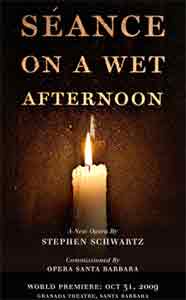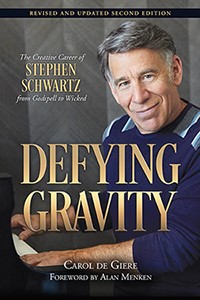
Seance opera world premiere in 2009: Michael Jackowitz (executive producer), Stephen Schwartz (composer-librettist), Scott Schwartz (director). Photo by Terence de Giere
Stephen Schwartz has adapted the movie Seance on A Wet Afternoon as an opera. Read all about it and view photos on Musicalschwartz.com/schwartz-opera.htm (opens in a new browser window)
Stay here to enjoy this audio clip: A conversation with composer Stephen Schwartz recorded while he was writing his first opera.
[audio:https://www.theschwartzscene.com/wp-content/uploads/2011/03/schwartzscene1-opera.mp3|titles=schwartzscene1-opera]
Full Transcript of the Podcast:
Carol de Giere: Welcome to The Schwartz Scene, first podcast. It’s April in 2007. I’m Carol de Giere and with me is Broadway and film songwriter Stephen Schwartz. Stephen, you’re working on your first full opera now. Could you tell everybody just how long you’ve been an opera fan?
Stephen Schwartz: Well I’ve really been conscious of being an opera fan since college when one of my roommates introduced me to opera. I heard La Boheme and got very enamored of first Puccini, and then some of the Russian operas, and then Wagner and the more contemporary operas, and really started listening to opera a great deal. I’ve been told by my parents that when I was two or something like that, they had a recording of, they think it was Boris Gudenov, which is interesting because that’s still my favorite opera, and there was a soprano aria that I really liked and that I used to call the “high lady.” My mother has said that I used to say I wanted to listen to the “high lady.” Of course I have no memory of that. [See the Defying Gravity biography chapter 1 for more about this.]
Carol de Giere: I’ve noticed that you’ve shown some influences of Puccini. I wonder if you could talk about any specific examples.
Stephen Schwartz: One that I’ve often cited is that Alan Menken and I based the song “Hellfire” in The Hunchback of Notre Dame, not musically but more conceptually, on the end of the first act of Tosca, which has the villain singing about his nefarious plans while a chorus of worshippers is singing in church at the same time. And of course in “Hellfire” we do the exact same thing. That was a conscious choice. Alan and I talked about it and I said we should do the end of the first act of Tosca here, that’s what this should be. Of course musically it has absolutely no resemblance.
I think you can hear influences of Puccini in stuff that I’ve done, and others too. Sometimes it’s deliberately pastiche. “Bravo Stromboli!” in Geppetto is a complete pastiche of Rossini, the famous Figaro aria from The Barber of Seville. In fact I asked the orchestrator, Martin Erskine, to completely ape in his orchestrations for “Bravo Stromboli!” the exact orchestra make-up that Rossini used for The Barber of Seville. So there’s lots of little opera influences poking around in things.
Carol de Giere: In Wicked your songs “No One Mourns the Wicked” and “No Good Deed” have really strenuous vocal requirements that apparently are like that required for an opera singer. I wonder if you could reminisce about writing those, and compare it with what you’re doing now. Talk about the requirements for this kind of work.
Stephen Schwartz: Obviously “No Good Deed” is, I think, pretty close to an opera aria. It’s just written for a different voice type, and it’s not written to be sung unamplified. So those are the two big differences. I mean, “No Good Deed” is written for a belter—I suppose a mezzo soprano could sing it. But the orchestra is so busy and obstreperous throughout that you have to have an amplified voice to carry over it, if you want to hear the words at all. But for instance there’s a moment in “No Good Deed” where she belts a big note and then there’s a place where it suddenly gets pianissimo—she has to hit the note very loud and hold it, and then get very soft—and that’s absolutely like something one would write in classical singing or an opera aria.
Or the moment where she does “Nessa, Doctor Dillamond,” and then sort of shouts out “Fiyero” while the orchestra is sawing away at one of the motifs. I think it’s structured very much like an aria but it’s built to get a great big hand at the end with a big belted last note. So it’s still very much musical theatre.
“No One Mourns the Wicked” —that’s just written for a soprano, the Glinda stuff. But yeah, it does get up there. It’s interesting, I’d written that before I really started working on the opera, and one of the things that has been interesting and surprising for me as I work with opera voices is that sometimes it’s easier for them to sing higher. In retrospect I might have actually set “No One Mourns the Wicked” higher. It might have been easier to hit the soprano notes than where they are.
Carol de Giere: I wanted to have you talk about what it’s like to work on a really long piece, and particularly with this creative concern of moving between the big forest and the trees. In your case you’re working on an individual song, but you have to keep in mind the entire piece: the musical, the opera, and the whole storyline. And you’ve quoted before from Tom Jones who wrote a book called Making Musicals. He said, “Everything is more important than anything.” So why do you think that’s true with operas and musicals. [Read all about books like Making Musicals on MusicalWriters.com]
Stephen Schwartz: I think it’s true for any dramatic work, whether it’s musical theatre or opera or musical movie or whatever. You can’t fall in love with any piece of it if it’s not serving the whole, which is what I think Tom Jones means by that. That’s why sometimes the best songs get cut from a musical because they’re not serving the whole story and the whole dramatic structure.
Carol de Giere: How do you find that out? You just watch it over time? I mean because you’re working in the part, but then…?
Stephen Schwartz: Yeah, exactly right. I think that you sort of go into this little section and you try to do something that will work for that particular moment, and of course you keep in mind the overall structure, but sometimes you’re wrong. And then when you step back and you hear it within the whole context, it doesn’t work, and then you have to lose it or change it.
Carol de Giere: Is that one reason why testing your work along the way is so important?
Stephen Schwartz: Absolutely. I mean for me it is. For instance with the opera now, I’m simply trying to get through a first draft of the first act, and I have no idea what this is going to sound like and feel like when it’s all put together. Obviously I know what the individual pieces are going to sound like, but what the cumulative effect is going to be, I have no idea.
And once I get through this draft, then I’m going to do a workshop where I’ll hear the first act, and I’m sure there are going to be a lot of unpleasant discoveries and rude awakenings, and then maybe there will be some stuff that works better than I anticipate. Obviously I’m trying to keep the whole in mind, and I tend to write motifically anyway, so there are things that keep recurring and themes that get reused and sometimes they’re sung and sometimes they’re played in what will be the orchestra while the character is singing something else, and the fact that motif is occurring gives you information about the emotional state of the character, and all that stuff.
Obviously that’s not accidental that that happens, but it’s very hard, at least for me, to have a real perception of what the cumulative effect of an entire act is until I hear it.

